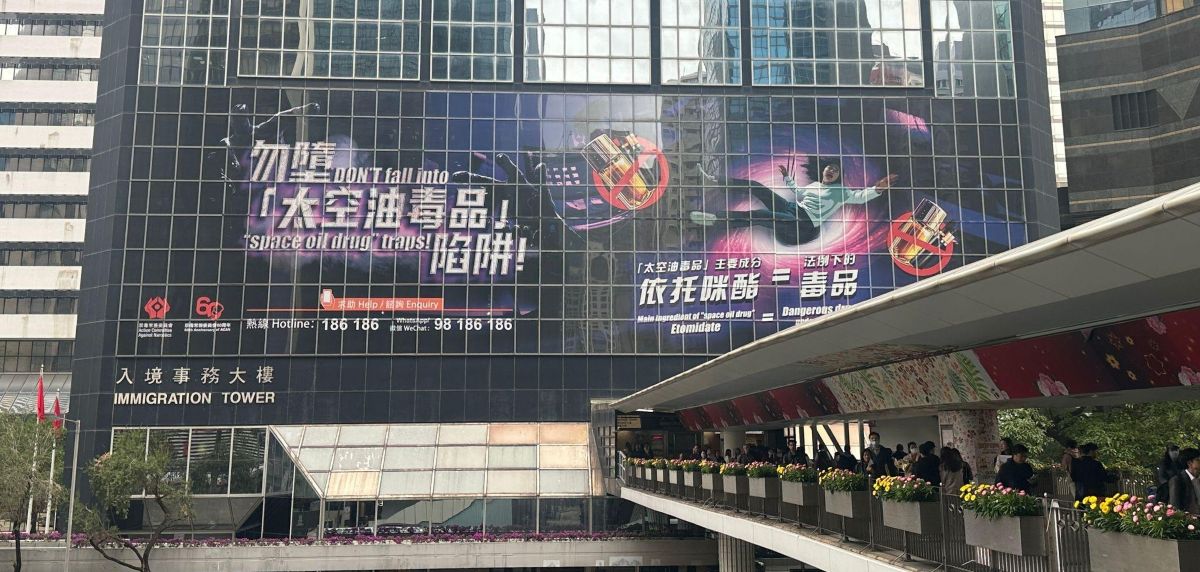By Arthur Chan
Hong Kong, 10 April 2025: Following a surge in the popularity of “space oil”, several key ingredients used to make the narcotic have been classified as dangerous drugs by the Security Bureau. The move brings with it heavy penalties for unauthorised possession, consumption or trafficking of the substance.
Space oil has rapidly become one of the most widely used recreational drugs in Hong Kong, especially among young people. It is commonly available in e-cigarette capsules. While there is no standard formula for the substance, it often contains etomidate or a variation of this as one of its main active ingredients.
Consequently, the authorities have classified etomidate, previously a Part 1 poison, as a dangerous drug, along with three analogues sharing similar chemical structures and properties, namely metomidate, propoxate, and isopropoxate. Two other substances have also been added to the Dangerous Drugs Ordinance (Cap 134): butonitazene, which is an opioid, and bromazolam, a drug with hypnotic and muscle-relaxing effects.
Unauthorised possession or consumption of the listed chemicals is punishable by up to seven years in prison and a maximum fine of HK$1 million. Anyone convicted of trafficking them faces up to life in prison and a HK$5 million fine.
Space oil is now the city’s third most popular drug among users aged 21 and under, after cannabis and cocaine, according to the latest figures from the Central Registry of Drug Abuse as reported to the Action Committee Against Narcotics. It is viewed as cheaper, more convenient and more palatable than other drugs, say social workers. Consequently, it attracts many first-time drug users, the majority of them young people.
Police recorded 278 space oil-related arrests last year, up from just eight in 2023, with 61 arrestees under 21. The force also said there had been a “notable increase” in the use of e-cigarettes for consumption of space oil last year. As well, the Hospital Authority said that in 2024 it saw some 130 cases of people seeking treatment at public hospitals linked to suspected use of space oil. Among them, there were three deaths.
Since the classification of etomidate and its variations as dangerous drugs, there have been some notable police actions. In March alone:
- A 16-year-old boy was arrested on suspicion of producing and trafficking space oil worth HK$200,000. He was alleged to have set up a manufacturing base in a North Point hotel room.
- An 18-year-old male and 15-year-old girl were arrested when police raided a flat in Yau Me Tei and seized narcotics worth HK$278,000, including ketamine and space oil vape cartridges.
- Police arrested 74 people in an anti-triad operation and seized HK$1.6 million worth of drugs, including e-cigarette capsules that contained space oil.
To further combat the newly popular narcotic, front-line officers have been carrying rapid test kits that can detect traces of etomidate and its variations since mid-January. So far, five arrests have been made using the kits.
In addition to enforcement actions, the authorities have launched a series of education and publicity campaigns to warn young people of the dangers of space oil. In the latest initiative, police officers are staging a new play, “Interactive Anti-Drug Theatre – A Space Study Adventure”, at various primary schools across the city.
Health workers stress that repeated use of space oil poses a danger to physical and mental health. It can lead to conditions such as addiction, memory loss, seizures, loss of consciousness and even death.
Arthur Chan is a Partner with BC&C. He specialises in Criminal Litigation and cyber fraud recovery claim and also develops a broad range of civil and commercial litigation such as immigration, personal injuries and employment issues. He has successfully dealt with cases involving account freezing and recovery, in one notable instance retrieving more than US$1 million that was stolen in an email scam. He can be contacted at Arthur@boasecohencollins.com.



